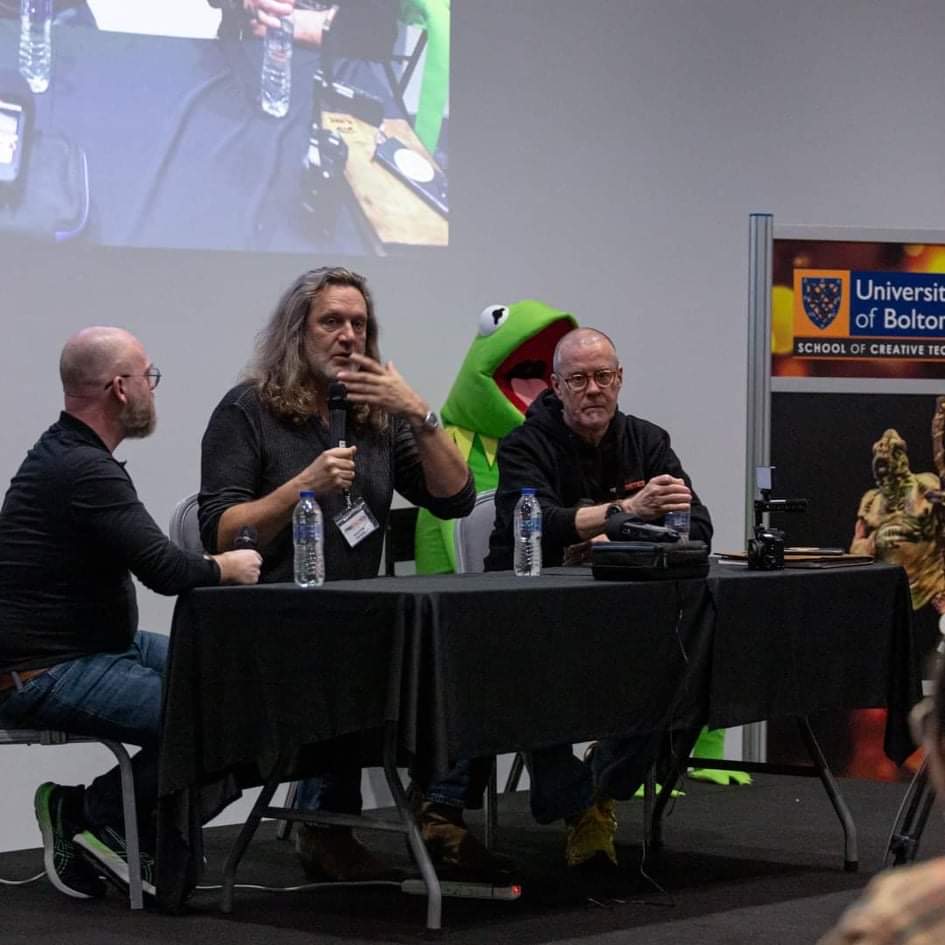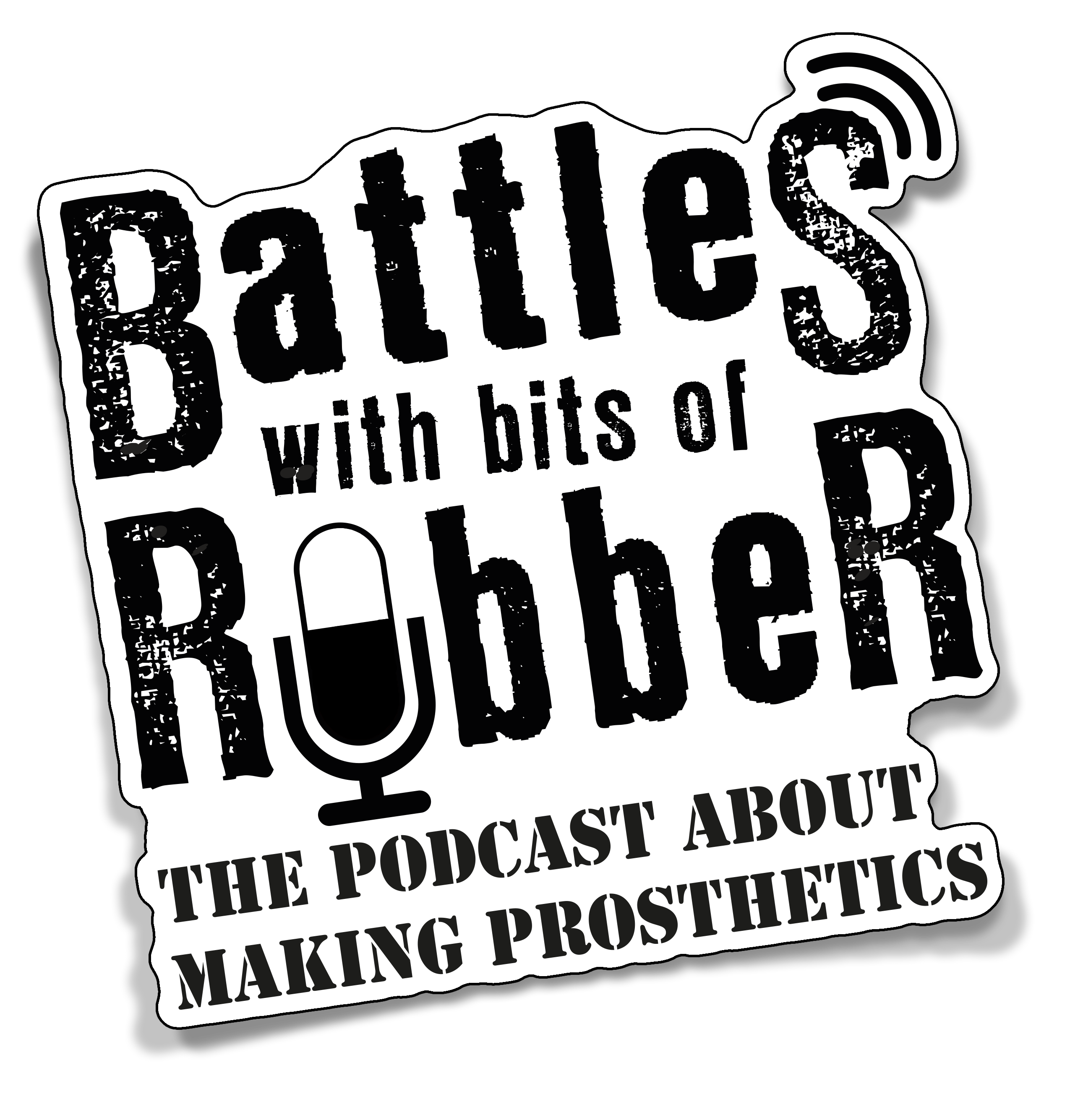
Our conversation recently with Jake Garber at The Prosthetics Event in Coventry was, we think, a very important chat worth listening to for anyone who is trying, or thinking about trying to get a foot in the door into the (oftentimes) wonderful and exciting world of movie and television makeup.
To listen to the podcast, you can stream or download from here, or simply subscribe through your favourite podcast app – we are on many, including Spotify, Apple Podcasts, Soundcloud, IHeartRADIO , STITCHER , Luminary and Google Podcasts.
Even for peeps already working in the industry, Jake’s extensive level of expertise and experience in a special and makeup effects career has seen him in many roles from straight beauty makeup and workshop lab work, as well as supervising workshops and sets, key makeup artist as well as being a personal artist to talent such as Samuel L. Jackson.

Jake Garber talking at The Prosthetics Event 2021
His TV credits include over 100 episodes of The Walking Dead, The Orville and Westworld. Movies include Avengers: Endgame, Hateful Eight, Django Unchained, Inglorious Basterds, and Kill Bill 1&2. That broad range of experience was wonderfully displayed at the Prosthetics Event to a packed education room.
We asked him about his work and how he broke into the industry, and then focussed on the specific skills and areas of attention someone looking to get into the field should be aware of. It was a fantastic discussion, and Jake dropped gold nuggets everywhere with his revealing and incredibly useful talk. One of the biggest takeaways from the conversation was to be proactive and take the lead in your own career. As jake said:
“I had to learn how to do everything before I even moved to Los Angeles. I had to know how to sculpt, how to make moulds, run pieces, hair work and apply because I didn’t have anyone else to turn to. That was a huge asset when I went into the labs.
The more you can do, the more you get to do. “
Many might say that without direct access to a dedicated mentor that they could never achieve their goals, but this is a good example of someone using that as fuel. This was before the internet before information was more easily accessible. Once again, the desire to do something to a high standard is a key component to success as it will sustain you during the inevitable difficult times one encounters pursuing anything of value.
We came away inspired, impressed and big fans of a fellow artist who was generous with their honest experience and wisdom. Plus it was a lot of fun.
- Delegation is important if you find yourself supervising. It isn’t possible to do everything yourself or micromanage everyone who works under you. After all, the jobs hopefully will get bigger so it is a real skill to be able to manage groups doing what you know how to do.
- Budgeting time is important, such as when applying makeup and trying to get the application times down without sacrificing quality.
- Learning to paint latex and foam latex is important. If you can paint these opaque materials well and make them look realistic, then you will become a better painter. It seemed that not many in the room have painted opaque materials, as silicone is so commonly used. In workshops, however, foam and slip latex still has a place and not knowing how to work with it is a disadvantage.
- The power of observation is important. Jake suggests that if you want to move up to being a set supervisor, Key (2nd) or HoD (Head of Department), or even a staff makeup artist or a day-player, watch and learn from those doing what you want to do.
Doing small realistic makeups often does not create the same fanfare on Instagram compared to gross-out gore stuff. However, the people who would pay money for good makeup skills know what is difficult to do, and showing how well you can blend rubber into real skin is a useful and employable skill.
It’s important to learn to create small in the beginning; a realistic nose has no fanfare, no pazzazz, but if you know, you know. It’s not about calling attention to the work, it’s being able to fool the viewer into believing it’s real by not calling attention to it.

Crowd rooms are the ‘bullpen’ where you cram in skills and learn from everyone. You never know who you are going to be working with or who may be running the next job. Being a day player can be fun because you get to do different things – you may be applying sideburns and moustaches one day, and bald caps the next. It comes back to Jake’s adage “The more you can do, the more you get to do.” As he said, you may not be applying makeup to any of the first five numbers on the call sheet in the main trailer, but you will gain invaluable experience working with a variety of makeup artists.
There are also business & admin skills which you need but may not be taught at schools. Things such as managing your income and tax when your working schedules fluctuate. How do you break down a script and budget the effects workload for a show?
Administrative duties can take a toll – beyond supervisory duties, there are the matters of resupplying materials that run out or run low, budgeting simultaneously for multiple shows in the future, meetings throughout the day, standing up for yourself and your team to Production, making travel arrangements, booking makeup artists for the next day, or next week, or next month.
There is a ton of stuff above and beyond just the application of makeup. A department head will have ‘The Scroll’ constantly in their head as they must be able to see all the things they need to do or worry about that hasn’t been done. There is stress involved. The key roles are not for everyone, and the way any hierarchy is, there needs to be a mix of people at the top and a multitude of skilled labour making those things happen.
Digital has changed everything, and it has made the quality of work much greater with higher standards. There is greater fidelity of image and more scrutiny is possible. The basic rule is to constantly get better because things change and you need to adopt, adapt or die.
The US Marine Corps has a saying: Improvise, Adapt, Overcome. This is great advice, and a valuable skill to develop.
Another piece of advice – have patience. We live in an immediate society and we have many things which show feedback quickly, yet most things in life – the good things – require a long game.
Some good questions came up about assertiveness and feeling confident which we dive deeper into in some later podcasts coming up. There are some hard truths about the hours and the life that makes… and whether it is really the life for you. Makeup artists are typically the first to arrive on set, and the last to leave. Shop hours can be more ‘normal’ by comparison.
Jake told us a fun little story with Dick Smith and a tricky life cast he (Jake) did on Tracey Ullman for Death Becomes Her, but we won’t spoil it here and will let him tell it. We covered a lot of ground with Jake at the Prosthetics Event, and hope you will come away with a lot of new, valuable information to help you get your career on the right track. We sure got a lot out of it, and we hope you will too.
Many thanks, as always, for your time checking the stuff out. You can email us directly at stuartandtodd@gmail.com or leave us a voice message on our site.
If you enjoy this podcast and got something out of it, would you do us a solid and tell just one more person about us? Send them a link and help us grow!
–Stuart & Todd
To listen to the podcast, you can stream or download from here, or simply subscribe through your favourite podcast app – we are on many, including Spotify, Apple Podcasts, Soundcloud, IHeartRADIO , STITCHER , Luminary and Google Podcasts.
